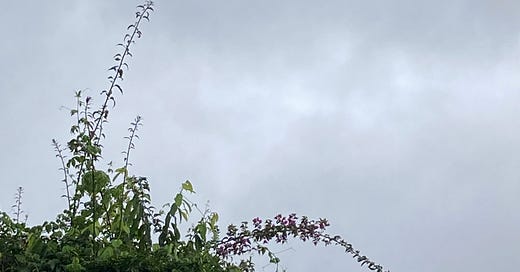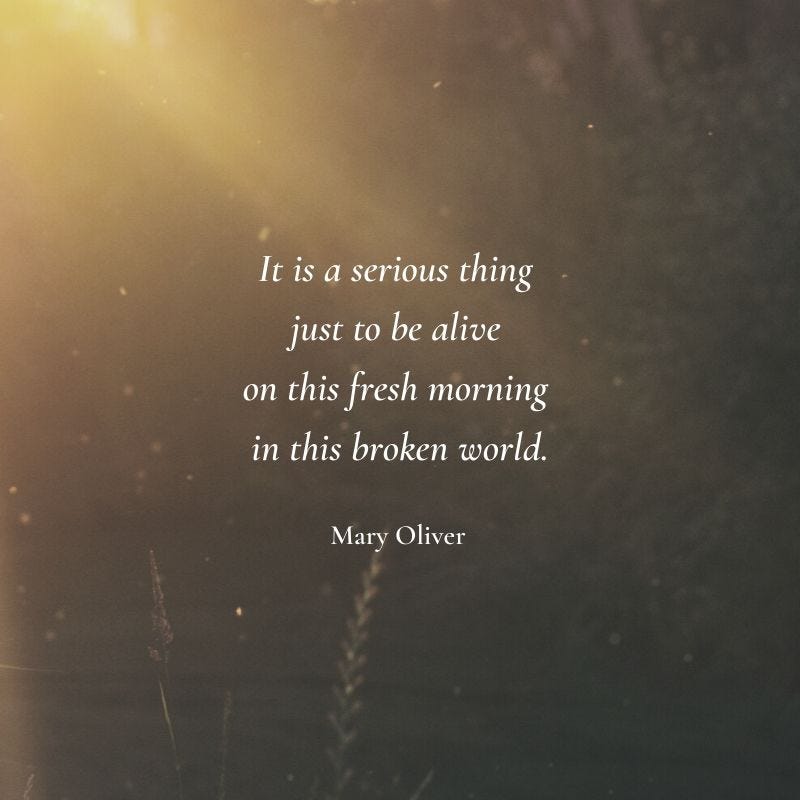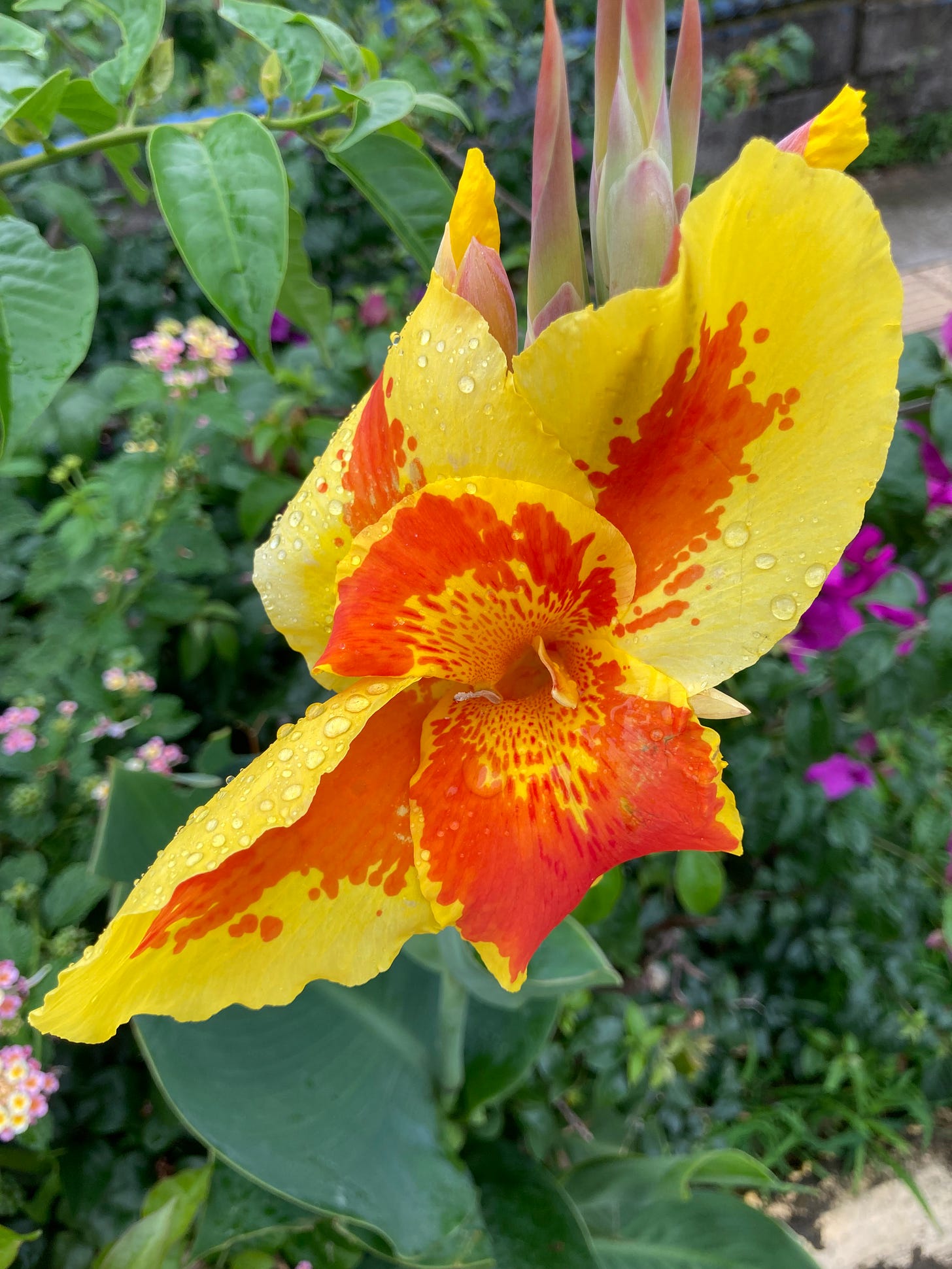Dear readers,
From now until it happens, we need to keep calling for a
CEASEFIRE NOW.
CEASEFIRE NOW.
CEASEFIRE NOW.
This poem (Invitation by Mary Oliver) has been coming to mind often these days, as I awaken in my peaceful and beautiful surroundings here in Costa Rica, in the comfort and safety of our little town, to the news of how much more bombing and devastation has occurred in Gaza, how many more civilians - so many of them children - have been killed in the genocide we are watching unfold in real time. It a serious thing to be alive on these fresh mornings: the arch of the bougainvilla against the clouds, a bright blood red and yellow flower on the street, the cry of Palestinian parents to please stop killing their children.
I look at Daphne in all her joy, playing pretend and prolific in her artwork, and I think of the children in Gaza. As of November 3, UNICEF reported that 420 children are being killed or injured per day in Gaza. This morning I read that one child is killed in Gaza right now every ten minutes. Ten minutes. In the time it takes me to write and send this, multiple children will have lost their lives needlessly to this violence, this genocide. This is unfathomable, unbearable, and yet, happening before our eyes. We must not look away.
It should not be controversial or debatable that every child deserves a happy childhood, deserves to have their needs met, deserves to live a life free from violence, war, bombing. Deserves conditions to thrive. Deserves love. This should be indisputable, something we can all easily agree upon, something we can all get behind.
So please, sign the petitions. Write or call your political representatives, especially if you are a US voter, again and again. Show up for rallies and marches if you can. Use your voice, in whatever way you are able, to call for an immediate ceasefire.
I have been sitting with the story and words of a Palestinian peace education colleague, Ayman Qwaider, who lost his sister and three nieces in the Israeli bombing of Gaza. Here is an interview with him, which I am sharing with you hear to invite you to join me in bearing witness to his story.
I am listening to Ayman’s devastating story. I think of the countless other stories like his. The lives lost like his sister, a mother and a teacher who gave so much to her community. As I write, the death toll in Gaza approaches 10,000. Ten thousand. In less than a month. Nearly half of those deaths are children. Each of those lives, a face. For each life lost, there is a history, a future, an entire world that was also lost. A web of relationships now in deep grief for this loss. For each life lost, there are dozens of family members grieving this terrible crime.
We grieve for all that is being lost.
I am teaching right now, my Peace Education: Theory and Practice class, which is a highlight for me of the academic year. The syllabus is my heart, and it is a joy and a gift to share this space with students who are yearning to make meaningful change through education.
On these fresh mornings in this broken world, my heart is full and my heart is heavy.
Last week, it was reinforced in me how important it is to name things, to name what is happening. As I have written about before, naming what’s happening often helps. It is not enough by itself, but it is a start. We can’t address anything until we have named what is happening.
How we name them, of course, is important too. Ceasefire. Genocide.
Even just saying, “I don’t know what to say right now,” is at least a start. We need to reach beyond that, but it’s a start. We don’t need to get it “right” - I am almost certainly not getting it “right” here - but we have to start and we have to have the hard conversations.
In our peace education classes, we are often having meta-conversations, engaging in pedagogies ourselves and then talking about how we might do this in other educational settings. In discussing the violence in Gaza last week, students asked for resources to support talking about Gaza and other topics that might be difficult to navigate in classroom spaces.
This is going to be different in every space, depending on context and depending on age - though I believe there is an age-appropriate way to talk about just about any difficult topic. Kids know and sense what is going on, especially when parents and caregivers are stressed or distracted. I believe we can and must develop the skills to engage with them. We owe it to them.
Here are some classroom resources I shared with students, which I am sharing with you in the hopes that they might be useful to you, in your life or in your roles as teacher, parent, caregiver, community member:
A strategy to better discuss Gaza by Janine de Novais
Zinn Education Project resources on teaching about the violence in Palestine and Israel
If you are having these discussions in classrooms or communities you are a part of, I would love to hear how you are navigating, what is working (or not working) and any additional resource suggestions you have.
Something else we did in our peace education class this week, which was already planned but felt like it went really well with this moment (all moments), is the Co-sensing with radical tenderness poem by Dani D’Emilia, Vanessa Andreotti, and the Gesturing Towards Decolonial Futures Collective. You can find the poem and recording here.
There are instructions on the page for how you can work with the poem. We used the following process (adapted slightly for time):
Listen to the poem recording (highly, highly recommend; 15 minutes).
Go back through the poem silently on our own and cirlced the phrases that stood out (this can be done concurrently with step 1, but it is also nice to just listen to it).
Distill the poem into 5 words or phrases and wrote them on a notecard.
Read aloud the phrases we selected as mini-poems.
After this, the next steps would be to create something for each phrase (artwork, a song, a dance, etc.) and practice with it for a month, then return to the poem and repeat. I put my notecard on my office altar, and I am at home now, otherwise I would share a picture with you! Another time.
If you listen to the poem and try the exercise, I invite you to share the 5 phrases that land with you in the comments or over email.
As I prepared to send this, I received the news that peace education pioneer and icon, Betty Reardon, has passed away. I invite you to read her obituary on the Global Campaign for Peace Education web site. The GPCE was one of the many global initiatives that she founded in her lifetime to promote peace through education globally. Like many, I stand on her shoulders and in the lineage of the beautiful body of work she created in her lifetime.
May we be her legacy. May we fortify our efforts for peace in her honor, as her continuation. May we learn to unlearn war, to abolish it.
May we find the strength and stamina to co-sense these times with radical tenderness, sensing and acting from our interbeing, with grace, courage, compassion, and humility.
May we not lose our humanity.
May we continue fighting for and working towards a world where all people are safe, healthy, thriving, and free. A world where it’s easier to love1. Where all life is valued and protected. Where all life is seen as sacred, and we act accordingly.
With love,
Stephanie
Paulo Freire, Pedagogy of the Oppressed, preface.






